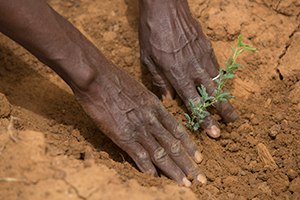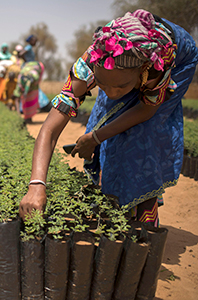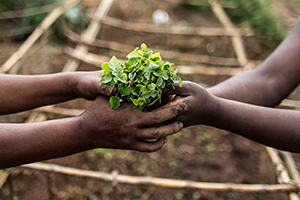Desertification and Drought Day “United for Land. Our Legacy. Our Future" - 17 June 2024

This year's theme of Desertification and Drought Day, “United for Land. Our Legacy. Our Future,” underscores the critical importance of collective action to preserve our planet's vital land resources for future generations.
Land is the foundation of our food systems, with 95% of the world's food produced on agricultural land. However, one third of these lands are currently degraded. This degradation affects 3.2 billion people worldwide, particularly impacting rural communities and smallholder farmers who depend on land for their livelihoods, leading to increased hunger, poverty, unemployment, and forced migration.
Climate change further exacerbates these issues, posing significant challenges to sustainable land management and agriculture, and undermining ecosystems' resilience.
Protecting and restoring degraded land is essential to ending poverty and hunger, achieving food security, and improving the livelihoods of millions of people, especially in developing countries.
The sustainable management of land, soil and water ressources are essential to increase food production, conserve ecosystems, improve land, soil and water quality, and strengthen the resilience of rural communities to extreme weather events.

Addressing land degradation through a holistic, landscape approach is critical to ensuring food security and resilient livelihoods. Integrated Land Use Planning, land governance, and tenure security are fundamental to achieving land degradation neutrality.
Over the past decade, the Food and Agriculture Organization of the United Nations has been at the forefront of technical programmes and activities supporting these initiatives.
In our efforts to restore and enhance ecosystem resilience and productivity, the following principles should be prioritized:
- We must prioritize women and youth who are vital stakeholders in land health and suffer most from land degradation, in order to ensure that science-based and people-centered land restoration becomes our legacy to future generations.
- We can’t tackle land degradation without unlocking the economic potential of degraded lands and drylands and building back more resilient agrifood systems.
- Large-scale land restoration for small-scale farming is crucial to combat land degradation.
- We need to use innovative monitoring and evaluation systems to measure progress towards achieving land degradation neutrality.

FAO remains committed to working closely with members and partners to combat land degradation, desertification and drought, striving for a land degradation-neutral world for present and future generations.
In the context of the Drought and Desertification Day, FAO will launch the Protocol for the assessment of sustainable soil management in an online roundtable. This Protocol will provide governments, technical institutes, NGOs and other stakeholders with the necessary tools and methodologies to assess and improve soil management practices. Details on this roundtable are forthcoming.


